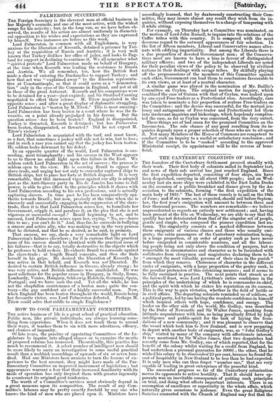HOW TO COOK PARLIAMENTARY COMMITTEES. Tar; active business of life
is a great school of practical education. Public men, like private individuals, are always learning some- thing from experience. When it does not teach them to amend their ways, it teaches them to sin with more adroitness, efficacy, and chances of impunity.
Of late years, the practice of appointing Committees of the Le- gislature to inquire into alleged abuses or to examine the merits of proposed reforms has increased. Theoretically, this practice has much to recommend it. A select number of intelligent men should be more likely to carry an investigation to some useful practical result than a mobbish assemblage of upwards of six or seven hun- dred. Had our Ministers been anxious to turn the lessons of ex- perience to the best account, they might have made of the Par- liamentary Committee an improved instrument of legislation ; but appearances warrant a fear that their increased familiarity with its mode of operation has only inspired them with greater ingenuity to counteract its original good tendencies.
The worth of a Committee's services must obviously depend in a great measure upon its composition. The result of any Com- mittee's labours may be pretty exactly foretold by any one who knows the kind of men who are placed upon it. hfimsters have accordingly learned, that by dexterously constructing their Com- mittee, they may insure almost any result they wish from its in- quiries, without exposing themselves to a charge of tampering with it while sitting.
For example, on Thursday last a Committee was nominated, on the motion of Lord John Russell, to inquire into the relations of the Cafe tribes with this counbry. It is composed with the most decorous regard to the outward appearances of fair selection. In the list of fifteen members, Liberal and Conservative names alter- nate with edifying impartiality. But among the Liberals there is a due proportion of devoted Government men ; of the Conserva- tives most are known to have a bias in favour of distinguished military officers ; and two of the independent Liberals are noted for their peculiar views of the policy to be observed by civilized nations in their dealings with savage tribes. By skilfully playing off the prepossessions of the members of this Committee against each other, Government can lead them to conclusions favourable to its own views, or at least of a neutral character.
A similar game was played in the nomination of Mr. Baillie's Committee on Ceylon. The original motion for inquiry, which combined the case of Guiana with that of Ceylon, was looked upon by one-eyed Free-traders as a Protectionist ruse. Accordingly, care was taken to nominate a fair proportion of zealous Free-traders on the Committee : and the device was successful, for the mutual jea- lousy and antagonism of Free-trader and Protectionist led them into irrelevant inquiries and bickerings, which hopelessly complica- ted the case, as far as Ceylon was concerned, from the very outset. These things are of bad omen for the promised Committee on the Income-tax. The sole chance of any good resulting from its in- quiries depends upon a proper selection of those who are to sit upon it. Not many Members of the House of Commons are competent to conduct such an inquiry to a useful or satisfactory conclusion ; and if the Committee is to be " cooked " according to the approved Ministerial receipt, its appointment will be the reverse of bene- ficial.


























 Previous page
Previous page